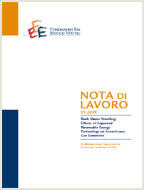How Green are Economists?

11.06.2016
Stefano Carattini (Haute éecole de gestion de Genève – University of Applied Sciences Western Switzerland, Grantham Research Institute on Climate Change and the Environment – London School of Economics and Political Sciences); Alessandro Tavoni (Grantham Research Institute on Climate Change and the Environment – London School of Economics and Political Sciences)
D6, H8, Q4
Voluntary Carbon Offsetting, Public Goods, Ecological Economics, Environmental Economics
Mitigation, Innovation and Transformation Pathways
Massimo Tavoni
The market for voluntary carbon offsets has grown steadily in the last decade, yet it remains a very small niche. Most emissions from business travel are still not offset. This paper exploits a unique dataset examining the decision to purchase carbon offsets at two academic conferences in environmental and ecological economics. We find that having the conference expenses covered by one’s institution increases the likelihood of offsetting, but practical and ethical reservations as well as personal characteristics and preferences also play an important role. We draw lessons from the effect of objections on the use of offsets and discuss the implications for practitioners and policy-makers. Based on our findings, we conclude that ecological and environmental economists should be more involved in the design and use of carbon offsets.
***
Suggested citation: Carattini, S., A. Tavoni, (2016), ‘How Green are Economists?’, Nota di Lavoro 43.2016, Milan, Italy: Fondazione Eni Enrico Mattei
